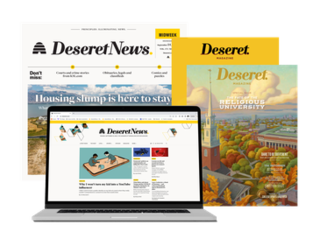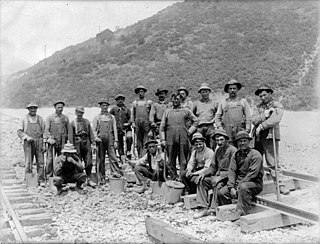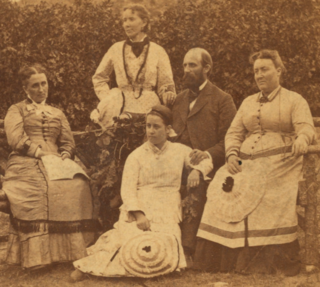
The Church of Jesus Christ of Latter-day Saints, informally known as the LDS Church or Mormon Church, is the largest Latter Day Saint denomination, tracing its roots to its founding by Joseph Smith during the Second Great Awakening. The church is headquartered in Salt Lake City, Utah, United States, and has established congregations and built temples worldwide. According to the church, as of 2023, it has over 17.2 million members of which over 6.8 million live in the U.S. The church also reports over 99,000 volunteer missionaries and 350 temples.
During the history of the Latter Day Saint movement, the relationship between Black people and Mormonism has included enslavement, exclusion and inclusion, and official and unofficial discrimination. Black people have been involved with the Latter Day Saint movement since its inception in the 1830s. Their experiences have varied widely, depending on the denomination within Mormonism and the time of their involvement. From the mid-1800s to 1978, Mormonism's largest denomination – the Church of Jesus Christ of Latter-day Saints – barred Black women and men from participating in the ordinances of its temples necessary for the highest level of salvation, prevented most men of Black African descent from being ordained into the church's lay, all-male priesthood, supported racial segregation in its communities and schools, taught that righteous Black people would be made white after death, and opposed interracial marriage. The temple and priesthood racial restrictions were lifted by church leaders in 1978. In 2013, the church disavowed its previous teachings on race for the first time.

Mormon fundamentalism is a belief in the validity of selected fundamental aspects of Mormonism as taught and practiced in the nineteenth century, particularly during the administrations of Joseph Smith, Brigham Young, and John Taylor, the first three presidents of the Church of Jesus Christ of Latter-day Saints. Mormon fundamentalists seek to uphold tenets and practices no longer held by mainstream Mormons. The principle most often associated with Mormon fundamentalism is plural marriage, a form of polygyny first taught in the Latter Day Saint movement by the movement's founder, Smith. A second and closely associated principle is that of the United Order, a form of egalitarian communalism. Mormon fundamentalists believe that these and other principles were wrongly abandoned or changed by the LDS Church in its efforts to become reconciled with mainstream American society. Today, the LDS Church excommunicates any of its members who practice plural marriage or who otherwise closely associate themselves with Mormon fundamentalist practices.

Pioneer Day is an official holiday celebrated on July 24 in the U.S. state of Utah, with some celebrations taking place in regions of surrounding states originally settled by Mormon pioneers. It commemorates the entry of Brigham Young and the first group of Mormon pioneers into the Salt Lake Valley on July 24, 1847, where the Latter-day Saints settled after being forced from Nauvoo, Illinois, and other locations in the eastern United States. Parades, fireworks, rodeos, and other festivities help commemorate the event. Similar to July 4, many local and all state-run government offices and many businesses are closed on Pioneer Day.

The Deseret News is a multi-platform newspaper based in Salt Lake City, published by Deseret News Publishing Company, a subsidiary of Deseret Management Corporation, which is owned by the Church of Jesus Christ of Latter-day Saints. Founded in 1850, it was the first newspaper to be published in Utah. The publication's name is from the geographic area of Deseret identified by Utah's pioneer settlers, and much of the publication's reporting is rooted in that region.

The Liberal Party was a political party established in the latter half of the 1800s in Utah Territory before the national Democrats and Republicans established themselves in Utah in the early 1890s.

The Apostolic United Brethren (AUB) is a Mormon fundamentalist group that practices polygamy. The AUB has had a temple in Mexico since at least the 1990s, an endowment house in Utah since the early 1980s, and several other locations of worship to accommodate their members in the US states of Wyoming, Arizona, and Montana.

The basic beliefs and traditions of the Church of Jesus Christ of Latter-day Saints have a cultural impact that distinguishes church members, practices and activities. The culture is geographically concentrated in the Mormon Corridor in the United States, and is present to a lesser extent in many places of the world where Latter-day Saints live.
Sexuality has a role within the theology of the Church of Jesus Christ of Latter-day Saints. In its standards for sexual behavior called the law of chastity, top LDS leaders bar all premarital sex, all homosexual sexual activity, the viewing of pornography, masturbation, overtly sexual kissing, sexual dancing, and sexual touch outside of a heterosexual marriage. LDS Leaders teach that gender is defined in premortal life, and that part of the purpose of mortal life is for men and women to be sealed together in heterosexual marriages, progress eternally after death as gods together, and produce spiritual children in the afterlife. The church states that sexual relations within the framework of monogamous opposite-sex marriage are healthy, necessary, and approved by God. The LDS denomination of Mormonism places great emphasis on the sexual behavior of Mormon adherents, as a commitment to follow the law of chastity is required for baptism, adherence is required to receive a temple recommend, and is part of the temple endowment ceremony covenants devout participants promise by oath to keep.

The Edmunds Act, also known as the Edmunds Anti-Polygamy Act of 1882, is a United States federal statute, signed into law on March 23, 1882 by President Chester A. Arthur, declaring polygamy a felony in federal territories, punishable by "a fine of not more than five hundred dollars and by imprisonment for a term of not more than five years". The act is named for U.S. Senator George F. Edmunds of Vermont. The Edmunds Act also prohibited "bigamous" or "unlawful cohabitation", thus removing the need to prove that actual marriages had occurred. The act not only reinforced the 1862 Morrill Anti-Bigamy Act but also made the offense of unlawful cohabitation much easier to prove than polygamy misdemeanor and made it illegal for polygamists or cohabitants to vote, hold public office, or serve on juries in federal territories.

All homosexual sexual activity is condemned as sinful by the Church of Jesus Christ of Latter-day Saints in its law of chastity, and the church teaches that God does not approve of same-sex marriage. Adherents who participate in same-sex sexual behavior may face church discipline. Members of the church who experience homosexual attractions, including those who self-identify as gay, lesbian, or bisexual remain in good standing in the church if they abstain from same-sex marriage and any homosexual sexual activity or sexual relationships outside an opposite-sex marriage. However, all people, including those in same-sex relationships and marriages, are permitted to attend the weekly Sunday meetings.
Marlin Keith Jensen is an American attorney who has been a general authority of the Church of Jesus Christ of Latter-day Saints since 1989. He served as the official Church Historian and Recorder of the church from 2005 to 2012. He was the 19th man to hold that calling since it was established in 1830. Jensen was made an emeritus general authority in the October 2012 general conference.
The Church of Jesus Christ of Latter-day Saints has been subject to criticism and sometimes discrimination since its inception.
Polygamy is the practice of having more than one spouse at the same time. Specifically, polygyny is the practice of one man taking more than one wife while polyandry is the practice of one woman taking more than one husband. Polygamy is a common marriage pattern in some parts of the world. In North America, polygamy has not been a culturally normative or legally recognized institution since the continent's colonization by Europeans.
Luz Robles Escamilla is the Senator for the Utah State Senate's 10th District. Prior to redistricting she represented the 1st District, defeating Republican Carlton Christensen for the seat November 4, 2008 after having beaten incumbent Sen. Fred Fife for the party nomination earlier that year.

Early in its history, the Church of Jesus Christ of Latter-day Saints had a series of negative encounters with the federal government of the United States. This led to decades of mistrust, armed conflict, and the eventual disincorporation of the church by an act of the United States Congress. The relationship between the church and the government eventually improved, and in recent times LDS Church members have served in leadership positions in Congress and held other important political offices. The LDS Church becomes involved in political matters if it perceives that there is a moral issue at stake and wields considerable influence on a national level with over a dozen members of Congress having membership in the church in the early 2000s, and about 80% of Utah state lawmakers identifying as LDS.

The Church of Jesus Christ of Latter-day Saints has been involved with many pieces of legislation relating to LGBT people and their rights. These include playing an important role in defeating same-sex marriage legalization in Hawaii, Alaska, Nebraska, Nevada, California, and Utah. The topic of same-sex marriage has been one of the church's foremost public concerns since 1993. Leaders have stated that it will become involved in political matters if it perceives that there is a moral issue at stake and wields considerable influence on a national level. Over a dozen members of the US congress had membership in the church in the early 2000s. About 80% of Utah state lawmakers identied as Mormon at that time as well. The church's political involvement around LGBT rights has long been a source of controversy both within and outside the church. It's also been a significant cause of disagreement and disaffection by members.
This is a timeline of LGBT Mormon history in the 1950s, part of a series of timelines consisting of events, publications, and speeches about LGBTQ+ individuals, topics around sexual orientation and gender minorities, and the community of members of the Church of Jesus Christ of Latter-day Saints. Although the historical record is often scarce, evidence points to queer individuals having existed in the Mormon community since its beginnings. However, top LDS leaders only started regularly addressing queer topics in public in the late 1950s. Since 1970, the LDS Church has had at least one official publication or speech from a high-ranking leader referencing LGBT topics every year, and a greater number of LGBT Mormon and former Mormon individuals have received media coverage.
This is a timeline of LGBT Mormon history in the 2010s, part of a series of timelines consisting of events, publications, and speeches about LGBTQ+ individuals, topics around sexual orientation and gender minorities, and the community of members of the Church of Jesus Christ of Latter-day Saints.
Kirton McConkie is an American law firm headquartered in Salt Lake City, Utah. It is the largest law firm in Utah, and it has long served as the external legal counsel for The Church of Jesus Christ of Latter-day Saints. It was ranked the 300th largest law firm in the United States in 2022 by the National Law Journal.